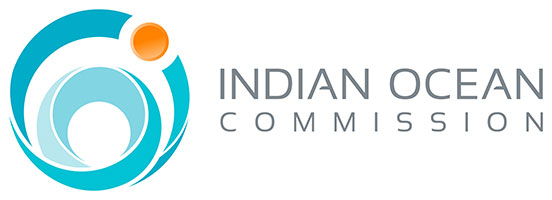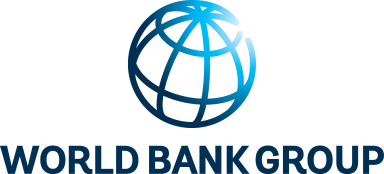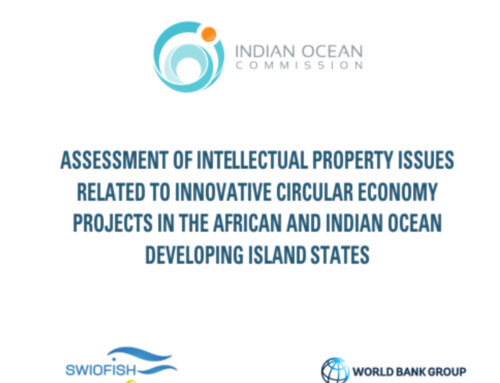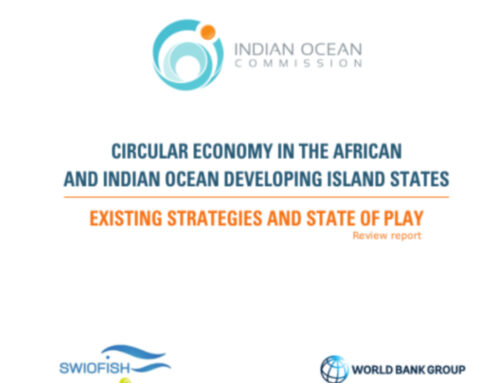This is a background study for prevention, reduction and control of marine plastic pollution in Africa Indian Ocean Developing Island States (AIODIS). The AIODIS included in the study are: Cape Verde, Comoros, Guinea Bissau, Madagascar, Maldives, Mauritius, São Tomé and Seychelles. La Réunion is a member of the AIODIS group, but is not included in the study. The study has a particular focus on development of sensitisation strategies and the role of the circular economy.
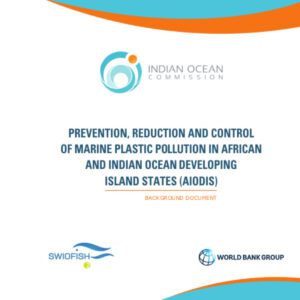 Part I summarises global and regional characteristics of marine plastic pollution (MPP). It describes the complexity of the MPP problem and the challenges facing governments, industries and consumers. It describes the scale of the problem, the nature of plastics, the structure of the plastics economy and global trade in plastics. It quantifies the impacts on economies and on the environment and on biodiversity. Part I sets out the problem of MPP in the context of international law, describes initiatives to build an international convention to prevent, reduce and control plastic waste, and briefly describes actions under two regional seas conventions.
Part I summarises global and regional characteristics of marine plastic pollution (MPP). It describes the complexity of the MPP problem and the challenges facing governments, industries and consumers. It describes the scale of the problem, the nature of plastics, the structure of the plastics economy and global trade in plastics. It quantifies the impacts on economies and on the environment and on biodiversity. Part I sets out the problem of MPP in the context of international law, describes initiatives to build an international convention to prevent, reduce and control plastic waste, and briefly describes actions under two regional seas conventions.
Part II addresses marine plastic pollution in AIODIS and builds on inputs from AIODIS stakeholders through Country Working Papers.
Part III describes the range of approaches and initiatives to prevent, reduce and control marine plastic pollution, with specific reference to the circular economy, to building awareness and to the challenges in AIODIS and small/ island economies.
The report sets out and builds on several conclusions:
- a clear understanding of the integrated nature of the problem of MPP is important for development of a national action plan to combat MPP
- public awareness of the problem is fundamental to building the political willingness for actions, as actions can incur costs for consumers, for businesses, for local authorities and to public finance
- consumers and businesses need to be engaged through stakeholder consultation and participation
- MPP is part of a more general waste management problem, in particular, the management of urban solid waste and waste generated by shipping and fisheries activities
- governments will require coherent policies, regulatory measures, public support for waste management, incentives for changes in consumer and business behaviours and support for innovation in and adoption of the circular economy in the business community
- in the AIODIS, national resources and efforts may need to be supplemented by external financial resources, including for private sector investment and technologies
- national actions should ideally be complemented with regional and global actions to be effective, as the problem of MPP is global, requiring actions across sectors and economies
- given the small size of many AIODIS economies, actions to combat MPP can benefit from a regional approach on trade in plastics and plastic waste which may generate the economies of scale and opportunities for a circular economy approach.
This report is a companion report for other reports to be prepared under this project. These other reports will examine the role of the circular economy in addressing plastic waste and plastic pollution in more detail and will also examine intellectual property rights, particularly those associated with circular economy technologies and initiatives.
